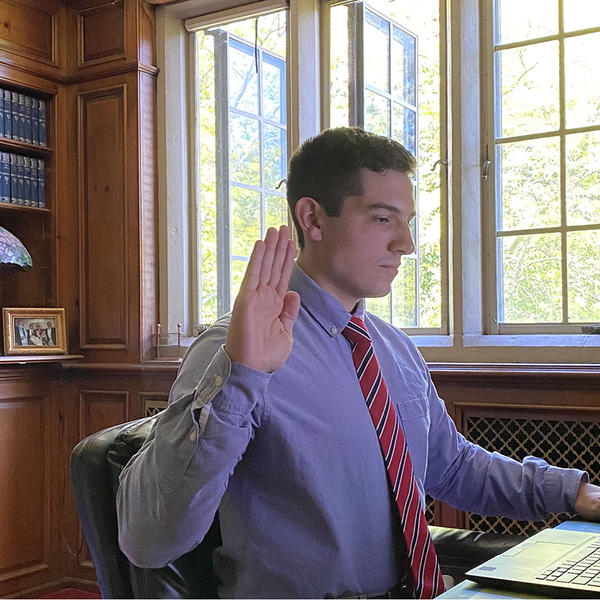For the past nine months, Rudy Antoncic ’22 worked as an intern at the U.S. Department of State, assessing how teleworking is going for their employees around the globe. Every day, he says, he talked with senior-level foreign officers in countries all over the world, checking in on how they adjusted to work-from-home operations during the pandemic.
But he hasn’t been working from the Department of State headquarters in the Harry S. Truman Building in Washington, DC. Just like the employees he is surveying, Antoncic is working from home — in his case, in McKeesport, Pa.
Throughout the pandemic, the J.D. Power Center for Liberal Arts in the World at Holy Cross has continued to offer experiential learning opportunities for students, though many internships this year are taking different forms than in-person for safety. Antoncic, a political science major with a concentration in peace and conflict studies, started his internship in the fall of 2020, when he participated the Washington Semester Program remotely, and then continued the work as part of the Academic Internship Program (AIP) during the spring 2021 semester.
“Participating in the DC semester was one of my dreams upon enrolling at Holy Cross,” Antoncic says. “With some coordination with my employer and my advisors, I was able to successfully enroll in a fully virtual posture. So like any other job, I showed up on my first day with a shirt and tie, from my home office, ready to do whatever it took to be helpful.”
The AIP, as well as both the DC and New York Semester Programs, were all ongoing in the spring semester, with students participating both remotely and in person. Students were offered both participation options during the 2020-21 academic year and made a choice based on their personal comfort level. Wherever they learned and worked from, they had the same invaluable real-world work experience and an opportunity to make a difference, even as undergraduates, in the industries and communities where they may someday have their careers.
“We worked very effectively with Career Development, Alumni Relations, Community-Based Learning and Government and Community Relations offices to reach out to our regular internship sites to see if they were available to do remote internships, and the response was amazing,” says Daniel Klinghard, professor of political science and director of the JD Power Center. “Our internship supervisors really kicked in and provided opportunities for students. Our work depends on internship supervisors and companies, government agencies and community partners who value interns and the kind of work they can do, and we’ve had that in abundance.”
Antoncic says that being a virtual intern encouraged him to step outside his comfort zone and create a presence for himself online, since there weren’t the usual personal interactions in the office.
“Working remotely really sharpened my professional and interpersonal skills in this manner and, in turn, allowed me to establish relationships with my supervisors and colleagues who were working remotely all over the world, with a host of global perspectives. I never would have been able to do this without being online,” he says. “I truly felt like my efforts touched the lives of others around the world and improved the operational efficiency of the Department in a very difficult time. These extraordinary opportunities offered through the J.D Power Center allowed me to gain incredibly valuable work experience while continuing to learn and contribute credit toward my degree.”
And Antoncic is just one of nearly 50 Holy Cross students who have been able to continue to gain this type of work experience throughout this atypical academic year. Klinghard says he was impressed at how the remote interns embraced the opportunity and did not let a different format dissuade them from making the most of the experience.
“Obviously, it is great for students to get the experience that will help them get jobs later on down the road, but most important, for me, is the way these experiences force them to embrace ambiguity and confront situations in which there might not be a textbook answer or a rubric that helps them figure out what they need to do,” Klinghard says. “From what I’ve heard from students, they are also seeing on the front lines how agencies and companies are dealing with the pandemic, and how they are continuing operations. These are important questions for students to think about, and not just read about in a textbook, but experience it.”
Holy Cross Students Continue Experiential Learning in a Remote Semester

Undeterred by the pandemic, nearly 50 students this spring found fulfilling experiential learning opportunities through the College's J.D. Power Center and other programs

